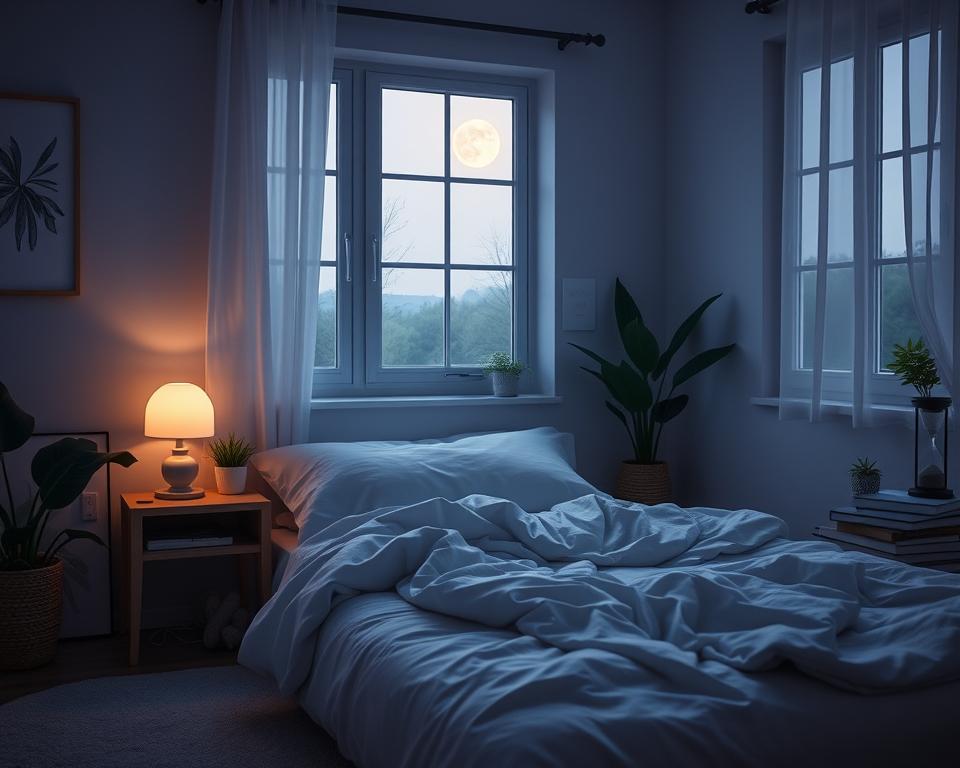Understanding “Get Good Rest” Meaning
Discover the true meaning of “get good rest” and learn practical tips to improve your sleep quality for better health and well-being. Unlock restorative sleep today.

In today’s fast-paced world, getting enough sleep is key. The phrase “get good rest” means more than just sleeping for a few hours. It’s about the quality and healing power of our sleep. This article will explore what “get good rest” really means and offer tips for better sleep.
Getting restful sleep is essential for a healthy life. It helps the body heal and keeps our minds, emotions, and bodies in top shape. By understanding what “get good rest” means and adopting good sleep habits, we can enjoy the many benefits of restorative sleep and wake up feeling refreshed every morning.
Read more interesting information at ::googrekas
What Does “Get Good Rest” Really Mean?
When we hear “get good rest,” we might think it means just sleeping enough. But “good rest” is more than that. It’s about the quality and healing power of your sleep.
Unpacking the Phrase
“Getting good rest” means sleeping in a way that makes you feel fresh, full of energy, and ready for the day. It’s not just about sleeping for a certain amount of time. It’s about making sure your sleep helps you feel new and improved.
Importance of Quality Sleep
Quality sleep is key to our health. A good night’s sleep helps our bodies and minds recover, fix things, and keep memories sharp. It keeps our immune system strong, controls our hormones, and boosts our thinking skills. Without restorative sleep, we might feel tired, moody, less productive, and more likely to get sick.
“Get good rest” is more than just sleeping enough. It’s about making sure your sleep is helpful and healing. This way, you can do your best in both body and mind.
Benefits of Restorative Sleep
Getting restorative sleep brings many health benefits. It’s key for a sharp mind, good mood, and feeling refreshed. By focusing on healthy sleep habits, you can enjoy better sleep hygiene.
Restorative sleep boosts brain power. It helps your brain store memories, process new info, and spark creativity. This means you’ll be more focused, make better choices, and be more productive during the day.
It also makes you feel better emotionally. Quality sleep keeps your mood stable, lowers stress and anxiety, and makes life more positive. This can make your relationships stronger and your life happier.
Plus, restorative sleep is good for your body. It helps your immune system, keeps hormones balanced, and supports heart health. People who get enough sleep are less likely to get serious health problems like obesity, diabetes, and heart disease.
“Sleep is the best meditation.” – Dalai Lama
Understanding the many benefits of restorative sleep helps you make better sleep choices. Adding healthy sleep habits to your daily life can improve your mind, emotions, and body.
Factors Affecting Sleep Quality
Getting good sleep is key to feeling well. Many things can change how well we sleep. Knowing about these can help us sleep better.
Physical Environment
Where we sleep greatly affects how well we rest. Things like temperature, lighting, and noise matter a lot. A cool, dark, quiet room is best for sleeping well.
Lifestyle Habits
Our daily habits also impact our sleep. Things like exercise, eating, and managing stress can help or hurt our sleep. Regular workouts, eating right, and reducing stress can lead to better sleep.
By working on our sleep space and habits, we can sleep better. This leads to feeling healthier and more refreshed.
“The key to a good night’s sleep is creating an environment that is conducive to rest and relaxation.”
Establishing a Bedtime Routine
Creating a consistent bedtime routine is key for good sleep and healthy sleep habits. A structured bedtime routine tells your body it’s time to relax and get ready for sleep.
Winding Down Activities
Doing calming activities before bed helps you relax. Here are some winding down activities for your bedtime routine:
- Light stretching or gentle yoga to release muscle tension
- Reading a book or listening to soothing music
- Taking a warm bath or shower
- Practicing mindfulness or deep breathing exercises
- Avoiding screen time (TVs, phones, tablets) for at least an hour before bed
These winding down activities prepare your body and mind for better sleep.
Being consistent with your bedtime routine is important. Following the same activities every night helps your body’s sleep cycle. This leads to better sleep hygiene and healthy sleep habits.
Creating a Sleep-Friendly Environment
Creating a quality sleep environment is key for healthy sleep habits and a good night’s rest. By adjusting temperature, lighting, and noise, you can make a space that helps you sleep well. This makes your sleep restful and restorative.
To make a sleep-friendly space, follow these tips:
- Temperature Control – Keep your room cool and comfy, between 65-68°F (18-20°C). This temperature helps your body’s natural sleep cycle.
- Lighting Considerations – Keep bright lights away before bed. Use dimmers or blackout curtains for a dark, calming space.
- Noise Reduction – Get rid of loud noises, like traffic or devices. A white noise machine or earplugs can help make it quiet and peaceful.
- Comfortable Bedding – Choose a great mattress, pillows, and bedding that support your body and sleep style.
Improving your sleep environment helps with sleep hygiene and better sleep quality. It’s a key step to getting the rest your body needs.
“A good night’s sleep is vital for your health. Making your sleep space sleep-friendly is the first step to getting the sleep your body needs.”
Stress and Anxiety Management
Getting good sleep is key to feeling well, but stress and anxiety can mess with it. These issues can make it hard to fall asleep or stay asleep. Luckily, there are ways to handle stress and anxiety that can help you sleep better.
Relaxation Techniques
Relaxation techniques are a strong way to deal with stress and anxiety. They calm your mind and body, getting you ready for sleep. Here are some top relaxation techniques:
- Meditation: This helps reduce stress and anxiety by focusing your mind and bringing peace.
- Deep Breathing Exercises: Slow, deep breaths can calm your body by activating the parasympathetic nervous system.
- Progressive Muscle Relaxation: This method involves tensing and relaxing muscles to help you feel calm.
Adding these relaxation techniques to your bedtime routine can greatly improve your sleep. It also lessens the effects of stress and anxiety.
| Relaxation Technique | Benefits for Sleep |
|---|---|
| Meditation | Reduces stress and anxiety, promotes mental focus and calm |
| Deep Breathing Exercises | Activates the parasympathetic nervous system, promotes physical and mental relaxation |
| Progressive Muscle Relaxation | Helps the body and mind release tension, leading to a deeper sense of calm |
Using these relaxation techniques daily can help you manage stress and anxiety. This makes way for better sleep that’s restful and restorative.
The Role of Exercise and Diet
Getting good sleep isn’t just about sticking to a sleep schedule or making your bedroom comfy. It’s also important to think about how exercise and diet affect your sleep.
Exercise can really help improve your sleep. It helps your body’s internal clock work better, making you fall asleep faster and sleep longer. Activities like brisk walking, cycling, or swimming can make your sleep better. But, don’t work out too hard right before bed, as it can keep you awake.
What you eat also matters a lot for your sleep. Foods with tryptophan, like dairy, nuts, and whole grains, can help make sleep hormones. Eating less caffeine, alcohol, and big, spicy meals before bed can also help you sleep better.
| Exercise and Sleep | Diet and Sleep |
|---|---|
|
|
Adding regular exercise and a diet that supports sleep can help you sleep better. A complete approach to sleep, including your environment and lifestyle, is key for good sleep and health.
get good rest meaning: Achieving Optimal Sleep
Getting optimal sleep means more than just sleeping for a few hours. It’s about getting restorative sleep that makes you feel refreshed and full of energy. This part will look into what “get good rest” really means and how to get the quality sleep your body and mind need.
Quality sleep is key for your health in every way. When you sleep well, you’re not just resting. You’re letting your mind recharge, your muscles heal, and your health improve. The aim of “get good rest” is to get deep, continuous sleep that helps your body and mind fix and refresh themselves.
The Pillars of Optimal Sleep
To get optimal sleep, you need to look at everything that affects how well you sleep. This includes:
- Keeping a regular sleep schedule and bedtime routine
- Creating a sleep-friendly environment with the right temperature, lighting, and noise levels
- Using stress and anxiety management techniques to relax
- Adding exercise and a healthy diet to your life
By focusing on these areas, you can really understand what “get good rest” means. And you’ll see the big benefits of quality sleep.
| Factors Affecting Sleep Quality | Strategies for Optimal Sleep |
|---|---|
| Physical Environment | Keep your bedroom cool, dark, and quiet |
| Lifestyle Habits | Stick to a regular sleep schedule and relax before bed |
| Stress and Anxiety | Use stress-lowering activities like meditation, deep breathing, or yoga |
| Exercise and Diet | Stay active and eat a balanced diet full of nutrients |
By focusing on these healthy sleep habits, you can really understand “get good rest.” And you’ll see how quality sleep can improve your overall health.
Sleep Disorders and Professional Help
Keeping healthy sleep habits is key, but sometimes you need professional help. Sleep disorders can really affect your well-being. It’s important to know when you need medical advice and act on it.
Signs to Seek Medical Advice
If you’re having trouble falling asleep or wake up a lot at night, you might have a sleep disorder. If you feel tired all day or your sleep quality drops, see a doctor. They can find out what’s wrong and help you sleep better.
Snoring, feeling tired all day, and trouble focusing can mean you have a sleep disorder like sleep apnea. These need a doctor’s check-up and care to avoid more health problems. Getting help for sleep disorders can help you sleep well again and stay healthy.
| Common Sleep Disorders | Symptoms | Potential Consequences |
|---|---|---|
| Insomnia | Difficulty falling asleep, frequent waking, unrefreshing sleep | Daytime fatigue, decreased productivity, increased risk of physical and mental health issues |
| Sleep Apnea | Loud snoring, gasping for air during sleep, daytime drowsiness | Increased risk of cardiovascular problems, stroke, and other health complications |
| Restless Leg Syndrome (RLS) | Uncontrollable urge to move the legs, especially at night | Difficulty falling and staying asleep, disruption of sleep patterns |
Knowing the signs of sleep disorders helps you get the help you need. Seeing a healthcare provider can lead to a full check-up, the right diagnosis, and a plan just for you. This can make your sleep much better.

Tracking Your Sleep Quality
Understanding your sleep quality is key to getting better rest and feeling good. By tracking your sleep, you can find ways to improve. This helps with sleep quality, healthy sleep habits, and sleep hygiene.
There are many ways to track your sleep. Wearable devices and mobile apps can monitor your sleep and give you insights. These tools help you understand your sleep better.
- Wearable devices like fitness trackers and smartwatches give detailed info on sleep stages, duration, and quality.
- Mobile apps like Sleep Cycle and Sleep as Android analyze your sleep patterns and offer tips to improve sleep quality.
- Sleep journals or diaries let you track bedtime routines, sleep quality, and what affects your sleep hygiene.
Tracking your sleep quality regularly helps you see patterns and trends. This info lets you make changes. You can adjust your sleep hygiene or try relaxation techniques to improve your healthy sleep habits.
| Sleep Tracking Method | Key Insights Provided | Potential Benefits |
|---|---|---|
| Wearable Devices | Sleep stages, duration, and quality | Comprehensive data on sleep patterns |
| Mobile Apps | Sleep analysis and personalized recommendations | Easily accessible and user-friendly |
| Sleep Journals | Bedtime routines and factors affecting sleep | Detailed record of sleep habits and experiences |
Using sleep tracking helps you understand and improve your sleep quality. This leads to better healthy sleep habits and overall well-being.
Developing Healthy Sleep Habits
Creating good sleep habits is key for getting quality sleep and staying healthy. The main step is to be consistent. Set a consistent sleep routine that your body can get used to. By focusing on sleep hygiene, you make your sleep area perfect for restful sleep.
Consistency Is Key
Being consistent is crucial for good sleep habits. Try to go to bed and wake up at the same time every day, even on weekends. This helps your body clock, or circadian rhythm, work better. This leads to more quality sleep and better sleep hygiene.
- Establish a regular bedtime and stick to it, even on weekends.
- Wake up at the same time each morning, regardless of how much sleep you got the night before.
- Avoid napping during the day, as this can disrupt your consistent sleep routine.
Keeping a consistent sleep routine trains your body to get ready for sleep at the same time every night. This improves sleep quality and helps you have healthy sleep habits.
“The secret of your future is hidden in your daily routine.” – Mike Murdock
Adding these tips to your daily life can help you build healthy sleep habits. These habits lead to quality sleep and better health.
Tips for Improving Sleep Hygiene
Getting good sleep is key to feeling well. Improving your sleep habits is a big step towards better rest. Here are some easy tips to make your sleep area better and help you sleep well:
- Create a Conducive Sleep Environment: Make sure your bedroom is cool, dark, and quiet. Use comfy bedding and blackout curtains or an eye mask to keep out light.
- Establish a Relaxing Bedtime Routine: Do calming things before bed, like reading, taking a warm bath, or stretching. This tells your body it’s time to sleep.
- Limit Screen Time: Don’t use devices like phones, tablets, or laptops in bed. The blue light from them can stop your body from making melatonin, which is important for sleep.
- Manage Stress and Anxiety: Use healthy ways to deal with stress, like exercise, journaling, or talking to a friend. Deep breathing, muscle relaxation, and mindfulness can also help calm your mind for sleep.
By following these tips and focusing on better sleep habits, you can get better sleep. This brings many benefits for your health.

“Thebed is a peculiar monster, the Tyrant Custom, the Hypocrite Habit, and the murderous Luxury have made it.” – Thomas Dekker
Being consistent is important for good sleep habits. Stick to a regular sleep schedule, even on weekends. Be patient with yourself as you work on better sleep. With time and effort, you can get the restful sleep you need.
The Impact of Poor Sleep
Getting good sleep is key to our health, but many struggle with it. Poor sleep can hurt our brain, body, and feelings. It’s important to know how it affects us to get better sleep and seek help when needed.
Cognitive Impairment
Not sleeping well can make it hard to focus, think clearly, and make decisions. People who don’t sleep enough might forget things, solve problems less well, and be less creative. This can hurt how well they do in school or work, and even everyday tasks.
Physical Health Risks
Poor sleep is linked to many health problems, including:
- Obesity and weight gain
- Cardiovascular problems, such as high blood pressure and heart disease
- Weakened immune system and susceptibility to illness
- Metabolic disorders, like type 2 diabetes
Good sleep habits are key for staying healthy.
Emotional and Mental Health Consequences
Poor sleep also affects our feelings and mind. Not sleeping well can make mood problems worse, like depression and anxiety. It can make us more irritable, moody, and have trouble controlling our feelings.
Fixing sleep issues and getting into good sleep habits is important for our mental and emotional health.
| Impact of Poor Sleep | Cognitive Function | Physical Health | Emotional Well-being |
|---|---|---|---|
| Consequences |
|
|
|
Poor sleep has big effects on us. That’s why it’s important to focus on good sleep habits and get help if we have sleep problems. By fixing the causes of poor sleep and using good strategies, we can get better sleep and feel great.
Conclusion
We’ve looked deeply into what “get good rest” really means. We’ve seen how important quality sleep is for our well-being. We learned about the factors that affect sleep quality and the benefits of healthy sleep habits.
We also explored practical ways to make our sleep better. This includes setting a regular bedtime routine and making our sleep space comfortable. We learned how to handle stress and anxiety to improve our sleep.
This article has given us a clear guide to better sleep. By using these tips every day, we can get the deep, restful sleep we need. This can make us feel better in body, mind, and heart.
As we end this journey, we see that good sleep is essential for our health. This article has given us the tools to take charge of our sleep. It sets us on a path to better sleep and overall wellness. Now is the time to start this journey to a healthier life.






